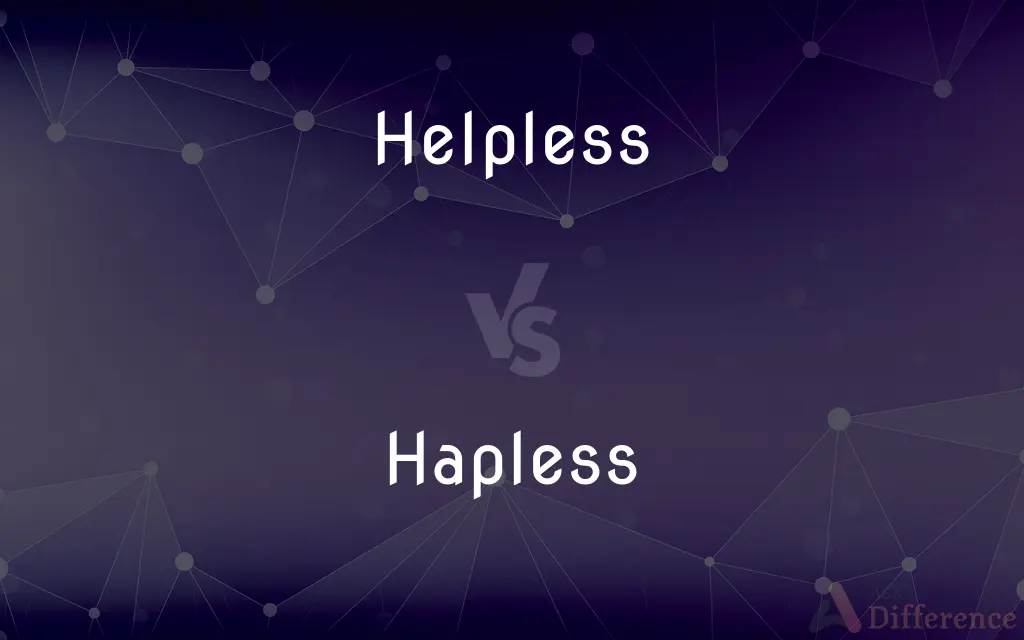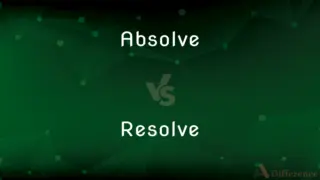Helpless vs. Hapless — What's the Difference?
By Maham Liaqat & Fiza Rafique — Updated on April 26, 2024
"Helpless" describes a lack of power or ability to act, while "hapless" refers to someone who is unfortunate or consistently unlucky.

Difference Between Helpless and Hapless
Table of Contents
ADVERTISEMENT
Key Differences
"Helpless" pertains to a state where one cannot help oneself or lacks the means to do so, often implying vulnerability or dependence. Whereas "hapless" suggests being marked by bad luck or misfortune, characterizing a person's experiences rather than their capabilities.
A helpless individual might be unable to change their situation due to external constraints or personal limitations. On the other hand, a hapless person might be fully capable but continually encounters negative circumstances beyond their control.
The term "helpless" is often used in situations that require intervention or aid, such as a helpless victim needing rescue. Conversely, "hapless" might describe someone who frequently makes poor decisions or is victim to unfortunate events, like a hapless protagonist in a series of comic misadventures.
In literature, a helpless character may evoke sympathy due to their plight, intended to garner emotional support from the audience. In contrast, a hapless character could be used to invoke a sense of inevitability or fatalism, often in a tragic or comedic context.
Understanding whether to use "helpless" or "hapless" depends on whether the emphasis is on the lack of power to act or on the unfortunate nature of circumstances.
ADVERTISEMENT
Comparison Chart
Definition
Lacking the means or ability to act
Unlucky, unfortunate
Focus
Capability and power
Luck and circumstances
Common Contexts
Victims needing rescue, unable to fend for oneself
Individuals encountering continuous misfortune
Emotional Connotation
Vulnerability, need for aid
Pity, fatalistic humor
Example Uses in Literature
Depicting characters in dire situations
Characters in tragic or ironic situations
Compare with Definitions
Helpless
Unable to defend oneself or act.
The kitten looked helpless as it was stuck in the tree.
Hapless
Marked by misfortune.
The hapless sailor was shipwrecked twice in the same year.
Helpless
Overwhelmed and unable to cope.
He stood there, helpless, as the chaos unfolded around him.
Hapless
Often encountering bad luck.
The hapless investor always seemed to buy stocks just before they crashed.
Helpless
Incapable of resolving a problem.
Faced with the complicated legal paperwork, she felt completely helpless.
Hapless
Unlucky in most circumstances.
It was just my hapless luck that I missed the last train home.
Helpless
Lacking support or resources.
He felt helpless when he lost his job and had no savings.
Hapless
Subject to adverse conditions.
The hapless city faced yet another natural disaster.
Helpless
Dependent on others for aid.
After the surgery, she was temporarily helpless and needed constant care.
Hapless
Characterized by pitiable ineffectiveness.
The hapless team lost every game of the season.
Helpless
Unable to defend oneself or to act without help
The cubs are born blind and helpless
Hapless
(especially of a person) unfortunate
The hapless victims of the disaster
Helpless
Unable to help oneself; powerless or incompetent.
Hapless
Luckless; unfortunate.
Helpless
Lacking support or protection
They were left helpless in the storm.
Hapless
(Especially of a person) unfortunate.
Helpless
Impossible to control; involuntary
Helpless laughter.
Hapless
Very unlucky; ill-fated.
Helpless
Unable to defend oneself.
Hapless
(Very) miserable, wretched, unhappy, measly, forlorn.
Helpless
Lacking help; powerless.
Hapless
Devoid of talent or skill.
Helpless
Unable to act without help; needing help; feeble.
Hapless
Without hap or luck; luckless; unfortunate; unlucky; unhappy; as, hapless youth; hapless maid.
Helpless
Uncontrollable.
A helpless urge
Hapless
Deserving or inciting pity;
A hapless victim
Miserable victims of war
The shabby room struck her as extraordinarily pathetic
Piteous appeals for help
Pitiable homeless children
A pitiful fate
Oh, you poor thing
His poor distorted limbs
A wretched life
Helpless
(obsolete) From which there is no possibility of being saved.
Helpless
Destitute of help or strength; unable to help or defend one's self; needing help; feeble; weak; as, a helpless infant.
How shall I then your helpless fame defend?
Helpless
Beyond help; irremediable.
Some helpless disagreement or dislike, either of mind or body.
Helpless
Bringing no help; unaiding.
Yet since the gods have beenHelpless foreseers of my plagues.
Helpless
Unsupplied; destitute; - with of.
Helpless of all that human wants require.
Helpless
Lacking in or deprived of strength or power;
Lying ill and helpless
Helpless with laughter
Helpless
Unable to function; without help
Helpless
Unable to manage independently;
As helpless as a baby
Common Curiosities
What does 'hapless' mean?
It describes someone who is unfortunate or has consistently bad luck.
What kind of emotional response does each word evoke?
"Helpless" often evokes sympathy and a desire to aid, while "hapless" may evoke pity or sometimes humor in light of continual misfortune.
Are 'helpless' and 'hapless' interchangeable?
No, because they emphasize different aspects of a person’s situation—capability versus luck.
What is an example of being hapless?
Continuously losing belongings in bizarre circumstances.
How do these terms function in literary contexts?
"Helpless" can establish a character’s immediate need for assistance, while "hapless" might define their enduring misfortune in a narrative.
Can a person be both helpless and hapless?
Yes, a person can be both unable to help themselves and also unfortunate in their circumstances.
How should I choose between using 'helpless' or 'hapless'?
Use "helpless" when referring to a lack of power or ability, and "hapless" when referring to an aspect of misfortune or bad luck.
How do these terms relate to societal views on autonomy and luck?
They reflect attitudes towards individual agency and the role of fate in people's lives.
What does 'helpless' mean?
It means lacking the ability or means to take care of oneself or to change one’s situation.
How do 'helpless' and 'hapless' differ in usage?
"Helpless" is used to describe a lack of power or capability, while "hapless" refers to being unlucky or unfortunate.
What is an example of being helpless?
Being trapped in a burning building without a way to escape.
Does the use of these words differ culturally?
Not significantly, but perception and empathy towards these states might vary culturally.
Why is it important to understand the distinction between 'helpless' and 'hapless'?
To accurately describe and understand situations or characters, whether in writing, speech, or analysis.
What is a common misconception about 'hapless'?
That it might imply helplessness, which it does not; it focuses solely on the aspect of misfortune.
What impact do these words have on character development in stories?
They provide depth and elicit specific emotional responses, shaping how readers view and relate to characters.
Share Your Discovery

Previous Comparison
Hobby vs. Interest
Next Comparison
Absolve vs. ResolveAuthor Spotlight
Written by
Maham LiaqatCo-written by
Fiza RafiqueFiza Rafique is a skilled content writer at AskDifference.com, where she meticulously refines and enhances written pieces. Drawing from her vast editorial expertise, Fiza ensures clarity, accuracy, and precision in every article. Passionate about language, she continually seeks to elevate the quality of content for readers worldwide.
















































